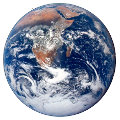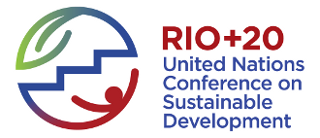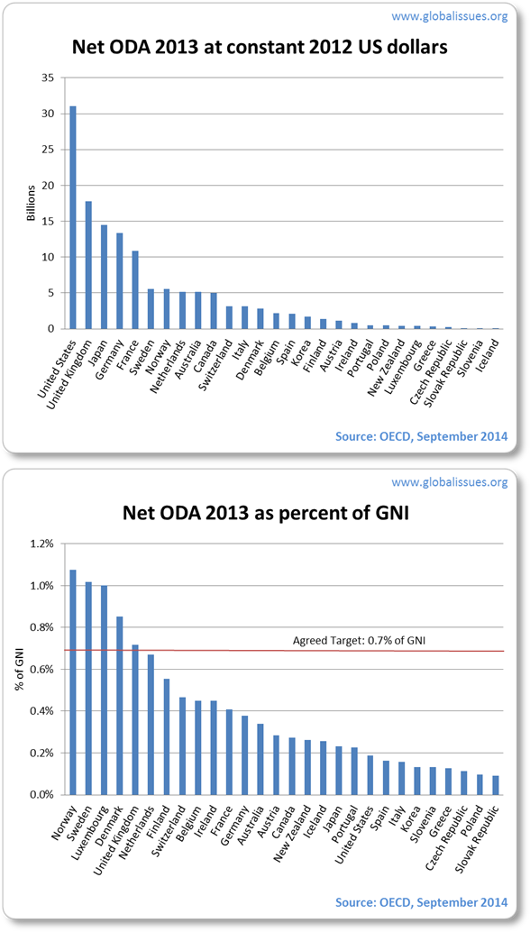Sustainable Development
Author and Page information
- This page: https://www.globalissues.org/issue/367/sustainable-development.
- To print all information (e.g. expanded side notes, shows alternative links), use the print version:
This part of the globalissues.org web site attempts to introduce the issue of development and sustainable development. Sustainable Development is often an over-used word, but goes to the heart of tackling a number of inter-related global issues such as poverty, inequality, hunger and environmental degradation.
In theory, development that is sustainable and not damaging to the planet is very possible. Of course though, in reality there are a lot of politics and challenges involved as highlighted throughout this site.
This section is woefully small to start off with, and hardly covers the issues in enough depth, though over time, I hope to add more articles to the ones below.
13 articles on “Sustainable Development” and 6 related issues:
Sustainable Development Introduction
 The idea of sustainable development grew from numerous environmental movements in earlier decades. Summits such as the Earth Summit in Rio, Brazil, 1992, were major international meetings to bring sustainable development to the mainstream.
The idea of sustainable development grew from numerous environmental movements in earlier decades. Summits such as the Earth Summit in Rio, Brazil, 1992, were major international meetings to bring sustainable development to the mainstream.
However, the record on moving towards sustainability so far appears to have been quite poor. The concept of sustainability means many different things to different people, and a large part of humanity around the world still live without access to basic necessities.
Read “Sustainable Development Introduction” to learn more.
Addressing Biodiversity Loss
 At the 1992 UN Conference on Environment and Development (the
At the 1992 UN Conference on Environment and Development (the Earth Summit
), the Convention on Biological Diversity (CBD) was born. 192 countries, plus the EU, are now Parties to that convention. In April 2002, the Parties to the Convention committed to significantly reduce the loss of biodiversity loss by 2010.
Perhaps predictably, that did not happen. Despite numerous successful conservations measures supporting biodiversity, the 2010 biodiversity target has not been met at the global level. This page provides an overview on how the attempts to prevent biodiversity loss is progressing.
Read “Addressing Biodiversity Loss” to learn more.
Rio+20 UN Conference on Sustainable Development
 Twenty years ago at the 1992 Earth Summit in Rio, countries adopted
Twenty years ago at the 1992 Earth Summit in Rio, countries adopted Agenda 21
— a blueprint to rethink economic growth, advance social equity and ensure environmental protection. Marking that anniversary, this year sees Rio+20, the UN Conference on Sustainable Development, with aims to get bold agreements to address things like poverty, sustainable development, decent jobs, etc.
This page provides coverage of recent events via Inter Press Service’s news feed.
Read “Rio+20 UN Conference on Sustainable Development” to learn more.
Poverty and the Environment
The causes of poverty and of environmental degradation are inter-related suggesting that approaching sustainable development requires understanding the issues from many angles, not just say an environmentalist or economics perspective alone.
Read “Poverty and the Environment” to learn more.
Non-governmental Organizations on Development Issues
What does an ever-increasing number of non-governmental organizations (NGOs) mean? NGOs are non-profit organizations filling the gap where governments will not, or cannot function. In the past however, some NGOs from the wealthy nations have received a bad reputation in some developing nations because of things like arrogance, imposition of their views, being a foreign policy arm or tool of the original country and so on. Even in recent years some of these criticisms still hold. However, recently some new and old NGOs alike, have started to become more participatory and grassroots-oriented to help empower the people they are trying to help, to help themselves. This is in general a positive turn. Yet, the fact that there are so many NGOs popping up everywhere perhaps points to failures of international systems of politics, economics, markets, and basic rights.
Read “Non-governmental Organizations on Development Issues” to learn more.
Foreign Aid for Development Assistance
In 1970, the world’s rich countries agreed to give 0.7% of their gross national income as official international development aid, annually.
Since that time, billions have certainly been given each year, but rarely have the rich nations actually met their promised target.
For example, the US is often the largest donor in dollar terms, but ranks amongst the lowest in terms of meeting the stated 0.7% target.

Furthermore, aid has often come with a price of its own for the developing nations. Common criticisms, for many years, of foreign aid, have included the following:
- Aid is often wasted on conditions that the recipient must use overpriced goods and services from donor countries
- Most aid does not actually go to the poorest who would need it the most
- Aid amounts are dwarfed by rich country protectionism that denies market access for poor country products while rich nations use aid as a lever to open poor country markets to their products
- Large projects or massive grand strategies often fail to help the vulnerable; money can often be embezzled away.
This article explores who has benefited most from this aid, the recipients or the donors.
Read “Foreign Aid for Development Assistance” to learn more.
G8: Too Much Power?
Read “G8: Too Much Power?” to learn more.
Water and Development
Issues such as water privatization are important in the developing world especially as it goes right to the heart of water rights, profits over people, and so on. This article looks into these issues and the impacts it has on people around the world.
Read “Water and Development” to learn more.
Corporate Social Responsibility
Corporate Social Responsibility is a bit of a buzz word and some feel that it has been diluted from its original aims, while others are trying to find innovative ways to engage with businesses to be more responsible in their practices.
Read “Corporate Social Responsibility” to learn more.
Energy Security
 Energy security is a growing concern for rich and emerging nations alike. The past drive for fossil fuel energy has led to wars, overthrow of democratically elected leaders, and puppet governments and dictatorships.
Energy security is a growing concern for rich and emerging nations alike. The past drive for fossil fuel energy has led to wars, overthrow of democratically elected leaders, and puppet governments and dictatorships.
Leading nations admit we are addicted to oil, but investment into alternatives has been lacking, or little in comparison to fossil fuel investments.
As the global financial crisis takes hold and awareness of climate change increases, more nations and companies are trying to invest in alternatives. But will the geopolitics remain the same?
Read “Energy Security” to learn more.
Brain Drain of Workers from Poor to Rich Countries
Brain drain is a problem for many poor countries losing skilled workers to richer countries. In healthcare, the effects can often be seen vividly. For example, in many rich countries, up to one third of doctors may be from abroad, many from Sub-Sahara Africa, while many African countries have as little as 500 doctors serving their entire population. Reasons for this brain drain vary, ranging from poor conditions domestically to attractive opportunities and active enticement from abroad.
Read “Brain Drain of Workers from Poor to Rich Countries” to learn more.
United Nations World Summit 2005
The UN World Summit for September 2005 is supposed to review progress since the Millennium Declaration, adopted by all Member States in 2000. However, the US has proposed enormous changes to an outcome document that is to be signed by all members. There are changes on almost all accounts, including striking any mention of the Millennium Development Goals, that aim for example, to halve poverty and world hunger by 2015. This has led to concerns that the outcome document will be weakened. Developing countries are also worried about stronger text on human rights and about giving the UN Security Council more powers.
Read “United Nations World Summit 2005” to learn more.
World Summit on Sustainable Development
This section introduces some of the issues on the international summit (August 26 - September 4, 2002) where thousands of delegates met to discuss various issues comprising sustainable development. Of course, there was a lot of controversy including differences between the global North and South on all sorts of issues such as corporate-led globalization, privatization of energy, water, health, etc. In addition there was also concern about motives and influences of large corporations on the outcomes of the Summit.
Read “World Summit on Sustainable Development” to learn more.
United Nations on Development Issues
The United Nations is the largest international body involved in development issues around the world. However, it has many political issues and problems to contend with. But, despite this, it is also performing some much needed tasks around the world, through its many satellite organizations and entities, providing a means to realize the Declaration of Human Rights. Unfortunately though, it is not perfect and is negatively affected by politics of powerful nations that wish to further their own interests.
Read “United Nations on Development Issues” to learn more.
Trade, Economy, & Related Issues
Read “Trade, Economy, & Related Issues” to learn more.
Consumption and Consumerism
Read “Consumption and Consumerism” to learn more.
Causes of Poverty
Poverty is the state for the majority of the world’s people and nations. Why is this? Is it enough to blame poor people for their own predicament? Have they been lazy, made poor decisions, and been solely responsible for their plight? What about their governments? Have they pursued policies that actually harm successful development? Such causes of poverty and inequality are no doubt real. But deeper and more global causes of poverty are often less discussed.
Read “Causes of Poverty” to learn more.
Environmental Issues
 Environmental issues are also a major global issue. Humans depend on a sustainable and healthy environment, and yet we have damaged the environment in numerous ways. This section introduces other issues including biodiversity, climate change, animal and nature conservation, population, genetically modified food, sustainable development, and more.
Environmental issues are also a major global issue. Humans depend on a sustainable and healthy environment, and yet we have damaged the environment in numerous ways. This section introduces other issues including biodiversity, climate change, animal and nature conservation, population, genetically modified food, sustainable development, and more.
Read “Environmental Issues” to learn more.
Aid
 There are numerous forms of aid, from humanitarian emergency assistance, to longer term development aid. Some provide food aid, or military assistance, but all these forms of aid seem to be accompanied with criticism, either around inefficiency of delivery, or of political agendas or more. This section attempts to look at some of these issues.
There are numerous forms of aid, from humanitarian emergency assistance, to longer term development aid. Some provide food aid, or military assistance, but all these forms of aid seem to be accompanied with criticism, either around inefficiency of delivery, or of political agendas or more. This section attempts to look at some of these issues.
Read “Aid” to learn more.
Author and Page Information
- Created:
- Last updated:

